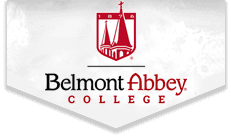- the development of appropriate learning experiences for children
You should consider the Abbey’s Elementary Education degree program if you:
- enjoy teaching children
- communicate easily
- are creative and patient
In addition to coursework, the Belmont Abbey Elementary Education Licensure Program prepares teacher candidates through top-quality mentoring and hands-on experiences including:
- 90 hours of classroom field experience over two semesters prior to student teaching.
- A full semester of student teaching, five days a week for 16 weeks, during your final semester of college.
We are guided by our Department of Education Mission Statement:
Guided by the tenets of Catholicism and the Benedictine hallmarks, the Department of Education’s mission is to promote commitment among students to serve and to be advocates for those most vulnerable in society, children. By our own example, we teach our students to understand the responsibilities and privileges entailed in this commitment. Through the study of the liberal arts and the knowledge, skills, and dispositions inherent in education courses and field experiences, we help our students develop minds that are both broad and agile, so they are equipped to make wise and ethical decisions that benefit them and those whose lives they touch.
With an Elementary Education bachelor’s degree from Belmont Abbey College, you will be able to pursue a variety of careers including:
- teaching grades K-6 in public and private elementary schools
The Abbey Difference:
More than a Career
At Belmont Abbey College we believe that being an elementary school teacher is not only a job, but a calling. Following the college’s mission for the promotion of excellence, the Elementary Education degree prepares its students for careers that focus on strengthening both mind and spirit as they share their love of learning in ways that glorify God.
A Close-Knit Program with a Wide Reputation
Belmont Abbey’s education graduates are heavily recruited for career teaching positions because of the elementary education program’s well-known reputation for quality and excellence. One distinction of our Elementary Education bachelor’s degree is class size: students study in a close-knit cohort of no more than 20 classmates who complete their entire professional sequence (licensure program) together. The merit of a highly-individualized environment can be recognized in the quality of learning and application, reflected in the fact that many Elementary Education BA graduates from Belmont Abbey College are hired as teachers during the student teaching experience or shortly following graduation. Additionally, for more than 3 decades the Abbey’s Elementary Licensure Program has maintained a strong reputation with regional and non-regional schools for graduating teachers who are outstanding classroom leaders.
Exceptional Faculty
Belmont Abbey College boasts an exceptional education faculty. Our instructors are expert advocates for quality K-12 education. Not only do they have extensive experience as classroom teachers as well as an individual area of educational expertise, they also present regularly at national education conferences and are strong contributors to the body of knowledge in the field. Some are respected educational authors. For example, our department chair, Dr. Sara Davis Powell, is the author of two popular college textbooks, both in the 4th edition, published by Pearson: Your Introduction to Education and Introduction to Middle Level Education.
Federal and State Compliance
The teacher education program at Belmont Abbey College is fully accredited through the North Carolina Department of Public Instruction (NCDPI).
The Sister Christine Beck Department of Education of Belmont Abbey College is in compliance with Section 207 of Title II of the Higher Education Act of the United States Department of Education. This act requires Institutions of Higher Education (IHEs) to report to the federal and state governments as well as to the public. These reports and relevant data are available upon request from the Sister Christine Beck Department of Education Office.
With an Elementary Education bachelor’s degree from Belmont Abbey College, you will be able to pursue a career teaching grades Kindergarten-6, with 6th grade licensure applying to both elementary and middle level settings. Because of North Carolina’s generous teacher licensure regulations, our education graduates with a K-6 teaching degree and clear license may also earn a license to teach other content area(s) at a variety of levels by fulfilling additional requirements as stipulated by the North Carolina Department of Public Instruction.
Program Requirements
To be eligible for acceptance into the degree program, the student must declare the major, have completed at least 9 hours of education coursework, and have on file a cumulative Praxis Core score of at least 468, or an SAT score of at least 1100 (math and verbal only), or an ACT cumulative score of at least 24. If taken after March 2016, the SAT score must be at least 1170. In addition, a student must have at admission, and maintain throughout the program, a GPA of 2.75 with no grade lower than a “C” in major courses. A student must submit an Application for Admission to the Elementary Education Teacher Licensure Program and pass a national background check. Students must be accepted into the program before beginning the Professional Sequence courses.
Major requirements: Prerequisites for Professional Sequence
- ED 300 Introduction to Education
- ED 303 Children’s Literature
- ED 305 Introduction to the Exceptional Child
- ED 310W Educational Development & Psychology
- ED 315 Arts Integration
Before taking any coursework in the Professional Sequence, a student must be accepted in the Elementary Education Teacher Licensure Program.
Professional Sequence: The Professional Sequence is comprised of three (3) distinct semesters (I, II, & III).
Professional Sequence I:
- ED 400 Classroom Management
- ED 402 Curriculum and Instructional Design
- ED 404 Math Foundations
- ED 405 Educational Assessment
- ED 406 Foundations of Language Arts
Professional Sequence II:
- ED 407 Literacy Assessment
- ED 408 Teaching Social Studies
- ED 409 Teaching Science
- ED 410 Teaching Mathematics
Professional Sequence III:
- ED 471 Student Teaching Seminar
- ED 475 Student Teaching
Other courses (16-21 Hours)
It is the student’s responsibility to see that all degree requirements for graduation are fulfilled.
- ED 300 Introduction to Education
- ED 303 Children’s Literature
- ED 305 Introduction to the Exceptional Child
- ED 308 Perspectives in Education
- ED 310W Educational Development & Psychology
- ED 315 Arts Integration
It is the student’s responsibility to see that all degree requirements for graduation are fulfilled.
Recommendation for Licensure
Upon completion of all program requirements, including those summarized below, a student is eligible for recommendation for teacher licensure in North Carolina. Recommendation for licensure in other states is subject to the laws and requirements of those states, and compliance with those regulations is the responsibility of the student. The process for recommendation for licensure is explained in the Student Teaching Handbook.
To receive Belmont Abbey College’s recommendation for initial licensure in North Carolina* a student must:
- Complete all required coursework with a minimum cumulative grade point average of 2.75.
- Receive the recommendation of the Chair of the Department of Education and of the Licensure Officer
- Receive the recommendation of the student teaching supervisors (IHE and LEA) and the designated LEA official responsible for LEA coordination of the senior-year student-teaching experience (Form IHE-01b).
- Successfully pass a background check conducted during student teaching.
- Complete all necessary application materials, obtain official transcripts, and pay any required state licensure fee(s).
As of August 2015, North Carolina allows elementary education program completers to teach for two years in NC public schools before requiring passing state-required assessments. Without passing scores, BAC will attest to program completion and the teacher candidate will pursue licensure through the state once the NCTEL/Praxis passing scores are achieved and edTPA is successfully completed.
As of the 2019-2020 school year, all teacher candidates must successfully complete the edTPA performance assessment to be considered a program completer eligible for NC initial licensure.
Federal and State Compliance:
The Elementary Education Teacher Licensure Program at Belmont Abbey College is fully accredited by the North Carolina Department of Public Instruction (NCDPI).
The Sister Christine Beck Department of Education of Belmont Abbey College is in compliance with Section 207 of Title II of the Higher Education Act of the United States Department of Education. This act requires Institutions of Higher Education (IHEs) to report to the federal and state governments, as well as to the public. These reports and relevant data are available upon request from the Sister Christine Beck Department of Education Office.


